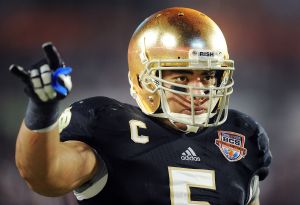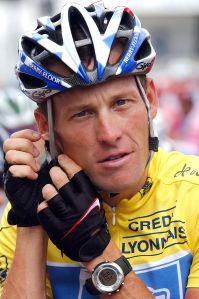For as long as many of us can remember, there has been a fascination that surrounded professional athletes and celebrities. They are heroes, role models and there are probably not many young men and women who don’t picture themselves being a superstar like these athletes.
But in the past two weeks, we’ve learned a lot about the top-tier athletes – especially of our generation – and who they really were away from the sports they dominated.
It started with an empty Hall of Fame class for Major League Baseball. On the Hall of Fame ballot were legendary stars that many of us idolized growing up: Barry Bonds, Sammy Sosa, Roger Clemens, Craig Biggio, Mike Piazza and Curt Schilling. Only Biggio came close to election with 70 percent of the vote. 75 percent of the vote is required to gain election.

Then another top-tier athlete, seemingly in a class of his own, admitted to using banned substances. Lance Armstrong, the champion cyclist who won the Tour de France seven straight times, discussed the usage of banned substances to Oprah Winfrey in a television interview that aired last week.
Finally, there is the saga of Notre Dame linebacker Manti Te’o and his girlfriend. Te’o had major sports markets including ESPN and Sports Illustrated completely fooled over the belief that his grandmother and girlfriend had passed away on the same day. Records of his grandmother’s death do exist but there is no record of his girlfriend’s death.
It is now known that Te’o’s girlfriend, Lennay Kekua, never existed. The two never met. And yet, it is believed Te’o ran with the story. So did his coaches. So did the entire Notre Dame football program. It was the inspiration behind a 12-0 season that nearly culminated in a national championship and made Te’o a Heisman Trophy finalist.
So are all of our favorite athletes and role models incredibly fake and living out lies? That is hardly the case.
There is a reason the baseball writers voted for an empty Hall of Fame class. There is a reason Lance Armstrong has come to the point of confession. There is a reason Manti Te’o’s imaginary girlfriend is among the top headlines.
What this whole series of events has really taught us is not that athletes and sports as we know it are fake, it’s that they are actually incredibly real. In the eye of the public, whether sports writers or fans, athletes are evaluated as people just like the average American.
To enter the Hall of Fame in baseball, there is a clause in the voting process that states that the player must have shown integrity to the game. Barry Bonds may have been the greatest home run hitter in the history of baseball but he was also a suspected cheater, liar and ultimately didn’t answer the questions people wanted answered. Did he respect the game he played? Did he respect the fans that deserve to know?
All of these suspected baseball stars will be Hall of Famers in due time. But until they are the most deserving on the ballot, until writers and fans alike feel they have paid the penalty for their actions off the field, none of them will be immortalized.
Additionally, Bonds, Clemens and the others are in the Hall of Fame. Their achievements are there and recognized. They are simply not considered Hall of Famers. That is an honor that so few earn. There is no denying that this era of steroids and performance enhancers happened. But to immortalize players for doing it has forced writers and fans to take a strong look at athletes on a more personal level.
For fans, it’s easy to change the view of an athlete over cheating and living a lie. Lance Armstrong has lost everything that made him nearly invincible. He was quite possibly the greatest athlete the world had ever known. He won a gruelingcycling race seven years in a row, all after beating cancer. He seemed superhuman.

Now, we have learned the reality. His success was false. His image is tarnished forever. And it is actually worse because he carried the story and lived the lie for so long.
Meanwhile, how will people view the Manti Te’o saga? If he didn’t play for one of the most prestigious college football programs in the nation, would anybody know his name? Would anybody care? And if the story was known to be false, why drag it out longer than it had to be?
In Te’o’s case, this is not living a lie as much as it is showing his naivety. How do you have a serious relationship with someone you never met? Until Te’o explains his side and tells his story, we will never know.
Ultimately, the sports world has proved to be vulnerable. Athletes are not immortal to controversy. They are susceptible to real problems that many average Americans face on a daily basis. And when it really comes down to it, all the money in the world and all the skill in the world do not separate human beings from still being equals in terms of morality.
What these events really taught us is that people still value the good in others. People still judge others based on how they live and how they treat others. And even the most superior of athletes, celebrities and superstars must be good people first.


